What’s the biggest misconception about the life of a fishing guide? It’s a question I’ve been asked, and have heard asked, countless times. If I had to provide an answer, it would be that it’s easy. That it’s as simple and stress-free as simply taking someone fishing. That the day begins and ends at the boat ramp.
Behind the veil of a full day’s guided trip, there are countless hours of accrued fishing knowledge and local knowledge; years spent locating fish and studying their behavior and tendencies in order to nail down just how to get one to eat a hook; hours spent tying flies, building leaders, and maintaining gear; vehicle and boat maintenance; time spent preparing food for lunches; drive time; hours spent riding a desk making travel and booking suggestions; keeping insurance, advertising, and other business operational mechanisms in tune; on-the-water instruction; and the immeasurable slew of decisions that must be made well to keep anglers on fish and having the most enjoyable experience possible. It is, after all, the service industry.
And because it’s the service industry, tipping is customary. However, there is still a good bit of confusion among anglers as to how, when, and why guides should be tipped. These days, it is generally accepted that an appropriate tip is approximately 20% of your trip cost. For a full-day float (whether one or two anglers are in the boat), that typically works out to around $100. For offshore or pricier charters, it might be more, while for a walk-and-wade day on a small trout stream, it might be a bit less.
But, instead of leaving you with my one-sided perspective, I’ve recruited the input of a diverse assemblage of some of the most respected guides from around the country and asked them to share their thoughts why, when and how much you should tip your fishing guide.
Brian Pitser—The Northern Angler
“One of my most memorable tips was early on in my guide career. I took a father and son out fishing and I could tell right away they had really been saving for the trip, and we had a spectacular time. We created some great memories for those two to share, and at the end of the day the shop person asked if they would like to leave a gratuity for the guide service. This completely caught them off guard, and it was apparently unplanned and probably out of their budget. The guy reached into his pocket and gave me $17 for a full day trip. He shook my hand and thanked me with a most genuine smile, and assured me they had a wonderful day and that this was an experience they will both remember forever. I thanked him genuinely for the gratuity, and with a bit of a lump in my throat, I slid his hard earned cash into my pocket. I am pretty sure it was their gas or food money for the ride home. To this day, it still ranks as one of the most generous tips I have ever received.
More Like This
Generally, your tip for a fishing guide should be based upon the total experience of the trip. There are days where the fish won't stop biting and days that you work as hard as possible and catch nothing for the efforts. The amount of gratuity should be based on how the guide controls all the variables, not on the number of fish caught. I believe that most guides worth their salt would agree. As a guide, I have the privilege of sharing very special times with clients. My clients work hard to make their money and I work hard to provide them the best overall experience in return. A typical guide gratuity for our outfitting service is 15 to 20%. That, more or less, has become a standard in the industry. Regardless of the tip amount, the effort is the same on my part, and I’m incredibly thankful for any gratuity on a day’s guided trip.”
Patrick Fulkrod—South Holston River Company
“Whenever I travel to fish, I hire guides. I feel my expectations of the guide may be higher than most. However, being a guide myself, I always tip. I am not saying a tip is mandatory, but it is an easy way to acknowledge a job well done. I have this same philosophy with the waitress at the restaurant, and the guy driving the Uber. The amount of tip can speak tremendously to the satisfaction of the guest. I think the guide needs to feel like he earned the tip. When I am asked by a guest about the protocol on tipping, my motto is: ‘A tip is never expected, but always appreciated.’ Guides are full of cheesy one-liners so there's another to add to the list.”
Brian Porter—Far Out Fly Fishing
“Having worked in a number of bars and restaurants over the years, I try to look at tips as not expected, but always appreciated. That said, its takes pretty poor service for me to tip less than 20% for food or drink.
Guided fishing trips are a bit different, though, and due to the unpredictable nature of the sport, it can be easy for people to gauge the trip, and consequently the tip, based on the ‘success' of the day. Most folks who hire a guide are hoping for a great day of catching, and so a lot of times a good tip is given when that happens. What a lot of them might not realize, however, is that the guide's job is much more difficult when conditions are less than ideal. That’s when you really earn your tips. Success on a tough day usually means having to dig deep and work hard to overcome high water, bad weather, uncooperative fish, or any of countless other factors that make the game of fishing what it is. To me, being able to keep customers engaged, having fun, and learning when fishing is slow is a crucial skill set for a fishing guide. Getting a really good tip for working your ass off on a difficult day is always a great feeling. Any guide worth hiring is going to want their customers to catch fish as much, if not more, than the customers do.
Early on in my guiding career, I had a really tough steelhead trip where my guy got blanked and I felt horrible about it. When I got home, I realized that he had left me the biggest tip I had ever gotten at that point, and I was pretty sure that he'd miscounted. Already bummed about the day, I became super worried that I had taken too much money from this guy, so after stressing about it for an hour or so I decided to call him and make sure. What started as an incredibly awkward phone call ended with him telling me he had really enjoyed the day, learned a lot, and that I had earned the tip. Needless to say, I went from bummed to elated in less than a minute, and on top of a great tip, that gentleman left me with a lesson I’ll never forget.
It’s easy for a guide to be the hero when fishing is easy, and there's absolutely nothing wrong with leaving a good tip on those days to show that you've enjoyed it. Nobody wants to struggle with nasty winds or high water or any other difficult conditions, but those are the exact situations that make guiding an occupation of skilled labor, as well as a service deserving of gratuity.”
Brian Shumaker—Susquehanna River Guides
“Tipping should never be expected, nor should it dictate the quality of service that the guide provides on a trip. I have clients that haven’t tipped or tip very little, but have fished with me for years and they are great clients, and I have clients that tip above and beyond. I think it really depends on the background of the clients, as far as if or how much they tip.
The reason for tipping guides: You can have bad weather, the fish don't want to cooperate, etc., but if the guide does everything that they can to provide a quality experience, then yes, I do believe they deserve a tip. If you catch an exceptional fish or fish, if you learn something new, or come away a better angler (improve your casting or technique) it is worth tipping.”
Jason Shepard—Fly Times Charters
“I never mention tips, but appreciate them. The fee for the charter covers the trip—the boat wear and tear, gas, gear (your rods, reels, and flies), knowledge, license, the convenience to fish a new area, and having somebody stand on a boat and push or row you around all day.
Tips, in my opinion, are for how well the guide performed. Was he on time? Was he professional? Did you catch fish or did they at least put you on fish for opportunities for shots? Did you learn anything new that day?
I feel that people that bait fish and switch to fly fishing and go on trips often don’t understand how much more goes into our side of the sport. It’s a lot harder than sitting on a hole for hours, dropping bait, waiting for a bite, and then going home. We are pushing or rowing boats, fighting currents or tides, hunting and identifying fish, and putting the client in the spot to get his shot.
Now, as far as the amount of a tip, that’s up in the air. Most of the time, for a good trip, it will be $100. That’s kind of standard. Tarpon trips can be more with multiple hook ups. There are days when it’s $0-$50, even though they caught multiple fish with a ton of work by you. However, there are days where everything just isn’t there working right—no fish, bad weather, wrong area, and so-on. If I haven’t done my job or performed as a professional guide, I turn down the tip. That said, it’s important to not punish the guide with no tip or bad reviews for not catching fish when he or she put you on them all day. It’s our job to give you the opportunity to catch the species you are chasing.
The bottom line is this: if you enjoyed your day and had opportunities at fish, whether you caught anything or not, your guide should probably be rewarded for a job well done.”
Consider these perspectives the next time you’re planning to take a guided trip, anywhere. Guiding fishing trips is not an easy line of work, and chances are, if you hire a guide, you appreciate their time and energy. It’s important to realize that, at the end of the day, you are supporting a person, just like you are when you spend money with any other small business. So, if you appreciate the experience you have—or even if you don’t, but you understand that the negatives were outside of anyone’s contro—tip to support the guide as an individual, to keep their lights on, and to keep them in business and on the water for next time.





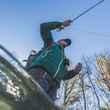


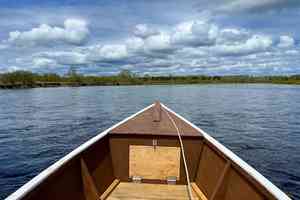



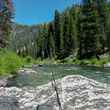
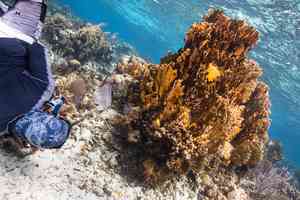


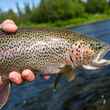
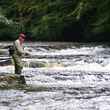



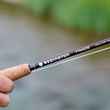
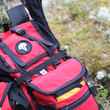



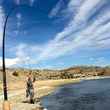
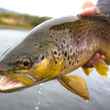
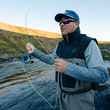

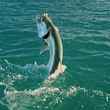
Comments
Peter Kaminsky replied on Permalink
A very right on piece. As long as the guide is capable , focused, and hard-working , I am satisfied—-whether or not I catch fish
Brent Calrson replied on Permalink
Great info! 2 questions:
How much does a guide take home if my trip costs $500 (pre-tip)?
What isn't considered the service industry?
Thanks!
Jay P replied on Permalink
Where I fish in SE Idaho, guides make 50-55% of trip fees. That includes gas, lunch, flys, and their angler acumen. For an all day non-float trip, a guide gets ~$325. Your tip matters. If they provide an epic experience they should get $100/guest. Minimum.
Daniel Podobed replied on Permalink
I think it's silly. Just ask for the amount you expect to get paid up front. As a client, I'm purchasing your services. If you think having a clean boat, well prepared flies, and good gear are tip worthy, you'll soon find yourself without clients in the future.
If you think managing the expectations of clients is difficult, you aren't being honest with them up front. Of course there are asshole clients who expect x, y, and Z but if you agree to take the clients and don't discuss their expectations, it's on you for taking on a lousy client.
I typically tipped 20-25% but did so annoyingly.
Ed replied on Permalink
As a working stiff I never got a Tip for doing my Job . The price of the trip is a stretch for me, I have often wished to go on a Guided trip.
Les replied on Permalink
Whether the fish are biting or not, it's customary to give a 15% or 20% tip to a hard working and knowledgeable guide. I booked a guide (single angler on a two-angler rate) float on the lower Henry's Fork last Fall. Although we were pursuing big browns with streamers (and eventually, nymphs and dries, because the fish were tight-lipped that day), all we had to show for our hard work was a 5-pound Northern Whitefish. My guide Chris A. worked his tail off, switching flies every 10=15 minutes and employed every trick he knew. Nevertheless, I gave him a substantial tip to show him how grateful I was for doing his best to try and get me into some hog browns.
Kevin replied on Permalink
My first guided trip was for bonefish in Hawaii. It was my first time going for bonefish and, while I got a chance to cast to several big bones and hooked two that broke off, I tipped over 20% of the total cost as the overall experience was great. What I leaned from the guide helped me hook three other bones fishing by myself on the reef near the house I was staying in on Oahu. To me what the guide taught me was more important then hooking than catching the fish.
Carl Chambers replied on Permalink
First, let’s get this out of the way. I always tip guides. The only time I wouldn’t tip is if the guide was rude or inexcusably late, etc. and that has never happened to me. With that said, if I book a trip through a shop, usually the guide is an employee, and he is probably not making all of the fee that I am paying, and my tip supplements his wages.
However, I fish with saltwater guides in Florida a couple of times a year. These guys are all self employed. They set their own rates. While I still tip, I always feel a little funny about it. It feels a little like going to a restaurant and tipping the owner.
Alan Peryam replied on Permalink
If the guy is an employee working for someone who takes part of the fee, tip more. If the guide works for him or herself and gets the whole fee, I tend to tip based on how it went and whether I liked the guide. That said, If I plan to tip well--say $100--I tip when the boat goes into the water, saying something like "I know we are both going to have some fun, so I'm tipping in advance." And everyone is happy from the start and we both don't have to worry about the issue again. Once I started doing it this way, every trip has been great and have I never wondered if I received less than the guide's best.
{might not work so well if the front-end tip was $20, however. . . .)
Brian Mack replied on Permalink
As a guide on the Fraser River, British Columbia we see clients from all over the world. There are many different views and cultures on tipping. For instance Europeans especially the English don't tip as a rule and if/when they do it's not much. We remember many groups that experienced epic fishing over their 5 days and at the end tipped about $20 day. On the other hand, Americans tend to tip quite well. $100 per day is quite common.
The most unusual and perhaps disturbing tip I got was from a Auzzie. He had a truly incredible Sturgeon fishing trip(several 200 - 300 lb fish). Near the end of the trip he took off his sweaty 'tropical flower patterned' shirt and offered it to me. I was befuddled and didn't know what to say but I found a polite response that conveyed the message of no thanks. He insisted and so I took it and laid the shirt on one of the seats in the boat. After he departed the other guides asked how my tip was. When I showed them my unique reward for a great day's work they laughed and laughed and made all kinds of jokes.
Just a note for guests who want to tip: Cash is King. Laundry ain't.
Ed M replied on Permalink
I always tip my guides.
I am a retired with some limits on my resources, but, guides work hard for their clients.
I tip between $50 and $100 depending upon either it's a half-day or full-day trip.
Whether I catch fish or not.
Good guides teach their clients to try and make the experience productive. And, I've learned a good deal from them even though I have flyfished for 35 years.
George replied on Permalink
Different type of tip: make sure you talk directly with the guide. I lined up with his wife, who works in his other business...a fly shop. Unfortunately for me, she must not have talked with him about my chosen quarry. By the time I realized we were fishing for a different species, one I know how to chase (inshore saltwater), it was too late to change...likely the wrong boat for one thing, as well as time going past quickly (as an aside, the weight rod, color of Clouser, leader, would work for both species, but very different areas for them to inhabit).
For me, since the money for a guided trip is rare, it was a waste. He spent most of his time either on the radio or his cell phone seeing what others were catching. I was shown one technique, in the last half hour. Was it worth it? Not to me. At $450 for a half day trip, I did give a tip, but I think the biggest thing I learned is that I probably won't bother with a guide again. The amount I paid would have taken my boat out a dozen and one-half trips, for a full day each time, rather than 4 hours once.
Sometimes learning experiences are expensive...this one was. I have talked with many other guides, learned much from them, but not from this world-renowned fellow.
John Byron replied on Permalink
It's easy. $100 a day. Two in a boat: $50 each. Period.
Not result dependent.
There's a saying in the Submarine Force: "Pay double and tip heavy and you'll always have a good time."
Anonymous replied on Permalink
I really appreciate this article! I was prepared, with cash (not a shirt!), to tip my guide on a Madison River float trip last Summer. At the end of the trip, I realized that I had no idea what was customary for this kind of guiding. I asked the fly shop guys what they thought was appropriate so, obviously, I revealed my Gumby status. I probably over-tipped by about 100% but I do not care.
My brother is a current part time and former ski bum instructor so I understand many aspects of the guide lifestyle. I only over-tipped 50% this Summer on the Snake so I think I have found my groove! Fun is fun and I have learned enough at this point to be a decent fly fisherman.
Mike
splitcane replied on Permalink
When I think about all places I spend money and what they charge for what I get in return, tipping a guide is a no brainer. My plumber and my auto repair guy both charge twice as much per hour as a guided trip--before marked-up parts, shop fees, etc. You can hardly find knowledgeable retail folks anymore. I paid 18% buyers premium and 3x the shipping fees I normally would for the last auction purchase I made. None of these people rowed my ass around the stream all day, tied on my flies, or fed me lunch. Be happy that your guide is doing all the work so you can relax and have fun (no matter the catch). Besides, if we didn't cover the tip, those guided trips would be $475 instead of $375 because the shop owners would have to pay the guides more and then you'd have no say in the matter at all and the guides would be less incentivized to do a good job. I once read that tips was an acronym for "to insure prompt service"; another way to look at it is "tip: it prevents spit (in your food)". Think about it--same could be said of the fishing you find on your trip...if you bring a good attitude and hint at generosity with the guide, you're going to get access to the best spots on the river.
Pages